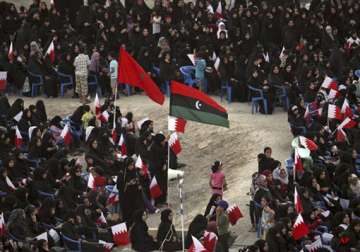Libya Elects New Govt Head, NATO Lifts Air Cover
Tripoli, Nov 1 : Libya's interim rulers today elected academic Abdel Rahim al-Kib to head a transitional government as NATO was set to end an air campaign that played a major role in ousting dictator
Tripoli, Nov 1 : Libya's interim rulers today elected academic Abdel Rahim al-Kib to head a transitional government as NATO was set to end an air campaign that played a major role in ousting dictator Moamer Kadhafi.
Kib, a native of Tripoli, was elected prime minister in a public vote carried out by the members of the National Transitional Council, an AFP correspondent reported.
The little-known academic who specialises in electrical engineering beat four other candidates, winning 26 out of 51 votes.
“This vote proves that Libyans are able to build their future,” NTC chairman Mustafa Abdel Jalil said after he voted.
NATO chief Anders Fogh Rasmussen earlier made a brief visit to Tripoli, saying he foresaw no major role left for the alliance in Libya hours before its air mission was due to officially end.
“At midnight tonight, a successful chapter in NATO's history is coming to an end. But you have also started writing a new chapter in Libya's history,” he told a joint press conference with Abdel Jalil.
Rasmussen was whisked off directly for talks at the Rixos Hotel but later had a chance to talk about the country's future with a group of about 60 young Libyans.
The visit came seven months after Western powers fired the first barrage of missiles against Moamer Kadhafi's forces in an air war that played a major role in ousting the veteran dictator.
The no-fly zone and naval blockade, enforced by NATO since March 31, will end today at local time 11:59 pm, as stipulated by a UN Security Council resolution last week that closed the mandate authorising military action. Operation Unified Protector was terminated even though Abdel Jalil had asked for the alliance to stay until the end of the year, warning that Kadhafi loyalists still posed a threat.
But NATO deemed that civilians were safe from attacks after the new regime declared the country liberated following Kadhafi's death and the fall of his hometown of Sirte on October 20.
Despite having his request for an extension of the mission turned down, the NTC chairman hailed NATO's crucial support and the precision of its air strikes.
“On behalf of the Libyan people, we express our appreciation and gratitude to the alliance, both the NATO alliance and Arab countries and friends. Thank you for that effort, which achieved victory for us,” Abdel Jalil said.
“The NATO operation in Libya was successful in a great way... It was very accurate in the way that civilians were not affected. I think the people of Tripoli testify to that,” he added.
Earlier, in an exclusive interview with AFP, Rasmussen said the military alliance was ready to help the new Libya.
“We have... clearly stated that if the new political leadership in Libya so requests, NATO stands ready to help them in their transformation to a democracy,” he said.
Areas where NATO could help included defence and security reform, he said, adding that member countries might be able to assist with border control.
“(But with) no NATO troops on the ground, I don't foresee a major NATO role. It's now for the United Nations to take the lead of the international assistance to the new authorities in Libya,” the NATO secretary general told AFP.
